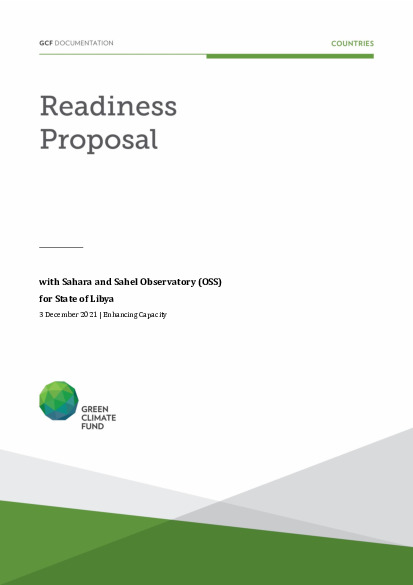Enhancing institutional, human and technical capacity of Libya system for climate finance

Enhancing institutional, human and technical capacity of Libya system for climate finance
Libya's engagement with the Green Climate Fund (GCF) represents an opportunity to mobilize the resources needed to finance the implementation of its national and international obligations as Party to the United Framework Convention on Climate Change (UNFCCC) and other conventions. This readiness project builds on Libya's previous efforts to strengthen its engagement with the GCF. Indeed, Libya has benefited in 2018 during the first phase of preparation from GCF support to prepare for climate finance. The proposal is aimed at strengthening the capacities of the National Designated Authority (NDA) to fulfil its roles and responsibilities in connection to the GCF and coordinate with different stakeholders. This resulted in the creation of a NDA, which is the main beneficiary of this project, the establishment of a non-objection mechanism, the development of a communication strategy and a gender study, as well as help fill some in capacity gaps and to promote the effective participation of relevant stakeholders (public and private sector).
Building on this momentum, Libya plans to further strengthen the capacities of its NDA by endowing it with a permanent secretariat, by improving at operational level the coordination mechanism as well as the non-objection procedures, through the development of strategic documents, such as the national climate change strategy. The NDA is the main beneficiary of this project that aims to capitalize on the results of the first readiness, through the development of this strategy to guide government action on climate change. In the absence of a Nationally Determined Contribution (NDC), this strategy will be determinant and key input for the elaboration of an ambitious country program, which is also planned under this project.
This proposal aims to identify and strengthen the capacity of potential national entities to meet the accreditation requirements of the GCF, and provide support for the development pipeline of high-quality project concept notes for priority mitigation and adaptation projects. Further, the engagement and the role of the private sector and the civil society will be at the core of this proposal. This will strengthen the country ownership and harness the role of the stakeholders in supporting the country mobilization of resources for climate change projects.